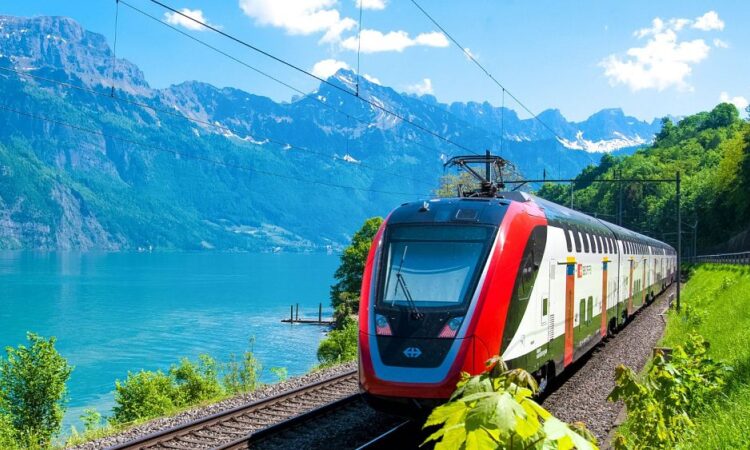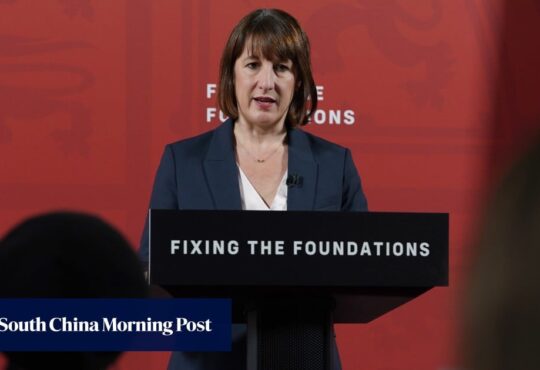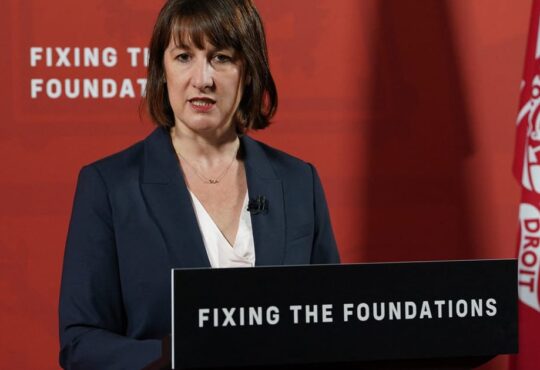France is raising taxes on flights to pay for trains: Should other European countries do the same?

Train travel is often more expensive than flying. Could taxing aviation to invest in the rail industry help change that?
France will increase taxes on flights to invest more in its railways, the country’s Transport Minister Clément Beaune announced this week.
The move aims to make train travel more appealing by closing the price gap between airline tickets and train tickets.
“Many people are shocked by the fact that it’s often cheaper to take a flight than a train,” he told French broadcaster RMC.
It’s a similar picture across the continent. Last month Greenpeace released an analysis showing that taking a train is on average double the cost of flying.
The report compared the costs of flight and train tickets on 112 routes in Europe, including 94 cross-border connections.
It found that they are almost always cheaper by plane.
Why are planes cheaper than trains?
One of the main reasons for this disparity is the lower taxes that the aviation industry enjoys.
If you fly from Paris to Barcelona the airline not only pays no VAT, but is also exempt from kerosene tax. If you make the same journey by train, the rail company will pay an energy tax and a passenger VAT. This means higher costs for the company which can then be reflected in ticket prices.
“In a climate crisis, giving tax exemptions to a super polluting sector is incompatible with the challenges of today,” says Jo Dardenne, the aviation director at the clean transport campaign group Transport and Environment (T&E).
She welcomes France’s plans and hopes it can go further in the future.
T&E calculated that if all of the aviation industries tax exemptions were removed across Europe in 2022, it would have raised €34.2 billion.
“It’s not the train that’s expensive. It’s the plane that’s not expensive enough,” the CEO of SNCF Jean-Pierre Farandou said in 2021.
“I don’t understand why airlines are exempt from any tax on kerosene. I pay taxes on my energy, on my diesel.”
It’s an argument that unsurprisingly doesn’t go down well in the aviation industry.
In response to the move by France, the largest EU airline association Airlines for Europe told Euronews: “France already imposes some of the EU’s steepest flight taxes. Hiking them further will not guarantee more funding for the decarbonisation of aviation or further rail investments.”
It also points to the industry’s importance to the economy and tourism sector. Raising taxes would lead to higher flight prices which could see less travel.
Dardenne counters that the climate crisis is a much bigger threat to tourism and points to the example of wildfires and heatwaves in Europe this summer that have been disrupting holidays on the continent.
What are the problems with cross-border rail in Europe?
Another problem that can raise costs of train travel on cross-border journeys compared to flights is the lack of cooperation between some national train companies.
Customers can feel the pinch on routes with a connection that has to be booked through two different companies that don’t have a ticketing agreement.
This is the case for the Brussels to Barcelona route via Lyon. In the French city you swap from a SNCF train to a Renfe one, but if your first train is late and you miss the connection you’re not entitled to compensation or another train ticket.
There’s also no Skyscanner (a flight search engine) equivalent for booking trains. According to industry sources, that’s because some national train operators’ websites run on such old operating systems that they can’t be integrated with a centralised booking website.
This makes it more difficult for consumers to find the best deals.
How can we make train and plane tickets more equal?
The European Commission has been working on an upcoming ‘Regulation on Multimodal Digital Mobility Services’ to improve the process of booking tickets across rail, bus and air.
Its proposal is expected in autumn, although 10 European and international associations signed an open letter in June urging the Commission to be ambitious after reports the proposal would be a watered down version of the original plans.
The EU is also aiming to revamp its energy taxes. It wants to introduce a tax on kerosene and make greener fuels cheaper, but there is currently no unanimity in the bloc.
France’s Transport Minister says he wants to see the country introduce one but it has to be done in conjunction with other countries.
“There’s no point in having a tax on kerosene in France if you don’t have it in Germany or Italy,” he explains. “We need European action.”
On a national level, Greenpeace believes we need to see more from governments. It calls on them to introduce climate tickets – affordable and simple long-term tickets valid on all means of public transport in a country or a defined region.
The group also wants the EU institutions to get involved to create a cross-border climate ticket. It says this could be funded by windfall profit taxes, the phase-out of airline subsidies, and a fair taxation system based on CO2 emissions.






